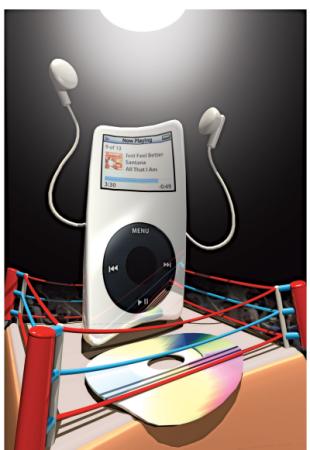 We’ve already seen that most music is advertised through a digital platform, such as commercials for smart-phones, MP3 players, or online subscription services. Yet you hardly see an ad for CDs anymore. Has the shift finally occurred from compact to digital?
We’ve already seen that most music is advertised through a digital platform, such as commercials for smart-phones, MP3 players, or online subscription services. Yet you hardly see an ad for CDs anymore. Has the shift finally occurred from compact to digital?
According to the New York Times, the movement has already started with Atlantic Records:
…more than half of its music sales in the United States are now from digital products, like downloads on iTunes and ring tones for cellphones.
And because digital music sales cannot compensate for CD sales, the industry is now looking for other means of income, like concert ticket and merchandise sales (although you wouldn’t know it by the amount of ads you see for those either).
John Seabrook for The New Yorker confirms the same thing:
With the collapse of the record business, as a result of piracy […] , the business of selling live music has become the main source of revenue for the popular-music industry.
(Here is the abstract of the article, since it is a subscription service).
And the digital movement just keeps growing. According to a report from IFPI (the International Federation of the Phonographic Industry) in January 2010:
- Global digital music trade revenues reach US$4.2 billion, up 12% in 2009
- 400 services licensed worldwide by music companies with ISPs, mobile and other partners
So what does this mean for the American music industry? And how does this all tie into the economic recession?
Because of the digital age, many Americans now get their music online rather than in hard format because it is a cheaper alternative. To make matters worse for the industry, many of these Americans also get a fair share of their music through illegal means, causing the industry to lose a lot more money. This reduces the amount of jobs allowed by the big players in the music industry.
And the United States isn’t the only victim. In the UK,
…if current online piracy trends continue, by 2015, losses due to piracy across the EU could reach as much as 1.2 million jobs and €240 (£212) billion in retail revenue in the sectors most affected: film, TV, recorded music and software. Losses in the UK alone are projected to be over 250,000 jobs and €7.8 billion in retail revenue if tough measures are not adopted.
(via Telegraph)
Hence the proposed Digital Economy Bill, currently being considered by the House of Commons – its goal being to counter online copyright infringement. Perhaps the United states needs to step up its game? It may not be what everyone wants, but it may just be what the music industry in America has to do to survive…

